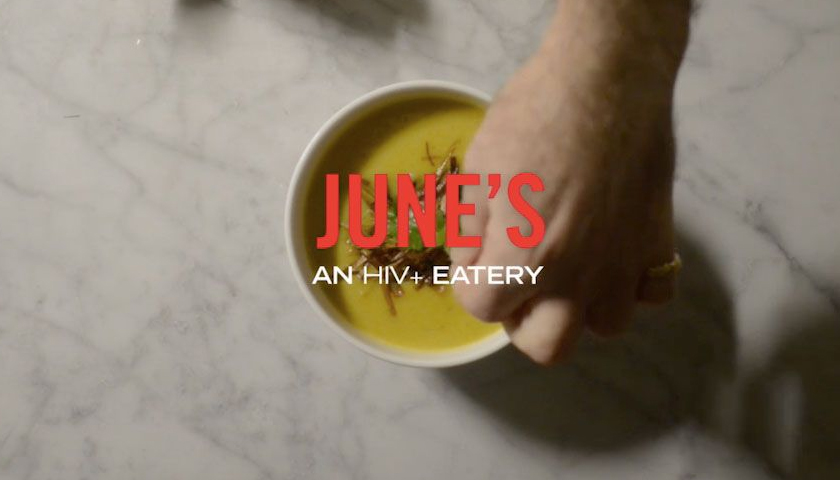Casey House – Canada’s first and only standalone hospital for those living with HIV/AIDS – has premiered June’s, a documentary directed by Academy Award nominee Hubert Davis. The film spotlights 14 brave people living with HIV/AIDS who challenged stigma by cooking at the world’s first HIV+ eatery that popped up in Toronto last November. Named in honour of Canadian activist and Casey House founder June Callwood, June’s HIV+ Eatery was launched in partnership Chef Matt Basile (of Fidel Gastro’s) who trained the 14 HIV+ patients-turned-cooks, most of whom had no previous kitchen experience. Together, they served 300 diners over three days – this journey is chronicled in the moving documentary.
We covered the story at the time:
Casey House Launches First-Ever HIV+ Eatery in Toronto to Bring Awareness of Stigma
The Break Bread Smash Stigma campaign and restaurant launched a movement and ignited a global conversation about the miseducation and stigma that still exists around HIV/AIDs. This documentary is an intimate look at the cooks and how participating in this initiative changed their lives. Each chef has a unique and personal story that reveals their humanity and sheds light on the realities of the impact of peoples’ perceptions of those living with HIV/AIDs.
You open the doc with the human need to share food to show affection. Why was it important to start that way?
Starting off this way was very purposeful. Food is intensely personal. It’s also something that provokes conversation, particularly in the context of the family-style meal our chefs served. Establishing this as a family-style meal, where people could openly talk, share and break bread, seemed like a fitting way to begin telling the stories of our brave chefs.
The release for the pop-up launch focused on “Smashing the Stigma” and the survey. The doc goes deeper into the project. Can you please tell me about how the doc is a continuation of the pop-up restaurant, and why it was important to make and share it?
The doc acts as a way for people to almost sit down with the chefs and enjoy a meal with them; break bread and understand them in a deeply personal way. It was incredibly important to tell the personal stories of as many of the chefs as we could,because if people knew them, it would be impossible to stigmatize them. They have all been through so much and yet come out on the other side even stronger. So strong that they were willing to expose themselves to the type of cowardly ignorance that does so much damage online.
Was there “cowardly ignorance” online during the pop-up? If so, how was it addressed and what was the end result?
This entire campaign was designed to draw out ignorance and stigma online, so that we could educate. Remember, this is an issue people have stopped talking about. On one hand we saw the worst of humanity with thousands of negative comments. But this actually allowed us to educate by jumping into the conversation with the facts. We had 24/7 community moderation for four weeks. On the other hand, we witnessed the best of humanity; by the time we had jumped in with the facts, we often saw that the person’s own social network had pounced on the stigma and called that person out. It was so reassuring. In total, we educated 730,000 Canadians directly on social.
Phase 1, the pop-up, featured the chefs with HIV and the restaurant, but did not tell their personal stories. Tell me about these new stories, about the chefs and their backgrounds, and what you want people to take away from their stories and participation in the project.
People have so many misconceptions about those who are HIV+. It’s also a disease that still comes with blame. When someone reveals their diagnosis, all sorts of questions come up that would never happen with other diseases like cancer. Questions like, “Are they a drug addict?” or “Are they promiscuous?” As you can tell from the documentary, each of our chefs has a unique story to tell. This disease crosses age, sex, ethnicity, and race. We think sharing their different stories will help people come to a better understanding of HIV.
Muluba being born with HIV and having the world around her slowly fall apart. Yet still having the strength to come out about her positive status on YouTube. It’s a heart-wrenching moment to see the pause she takes before she has the bravery to tell the world. It’s a beautiful moment.
The stigma even within the gay community is heart breaking, like when Guy talks about online dating and being completely ghosted once he reveals his status. I’m part of the LGBT community, and something like this makes you look at yourself and examine your own attitudes and biases, both in the past and present, as well as the damage it has done to someone, simply out of ignorance.
Imagine having your career as a physician taken away from you like Greg. Imagine the years of hard work and dedication slipping away because you’re HIV+ and no parent wants you to treat their sick child. People’s livelihoods were taken away from them because of stigma.
These are the types of stories that needed to be told in the documentary that we couldn’t tell at the pop-up.
These people are so much more than their disease. I really wish everyone could have been there for those three nights. The outpouring of admiration for these chefs was palpable. The energy in the room was so positive you couldn’t help but smile. It was a giant “fuck you” to anyone who was still ignorant about HIV.
Is there anything you learned while creating the pop-up and the doc that you’d like to share? Anything that surprised you? Any cool behind-the-scenes stories?
Honestly, one of the big things we all learned is how incredibly hard it is to open a restaurant and serve 300 people a fantastic meal. As much as this was about fighting HIV stigma, it was also about food. And the chefs worked incredibly hard to create a memorable culinary experience. I can honestly say the food was top notch. I know, because I ate everything all three days of the pop-up.
The doc had its premiere on April 24. Tell me about how you are continuing the “smash the stigma” at the premiere.
It’s really important that we continue our theme of food as an experience at the premiere. So the chefs will be working on gourmet popcorn for the 400 people in attendance. As well, after the screening, we are having a panel discussion with Hubert Davis, our Oscar nominated director, and the chefs. I think it’s going to be a really emotional experience because the premiere will be the first time the chefs see the film.
You chose to work with academy award nominated director Hubert Davis for this project. What was it about him, and his filmmaking/storytelling style, that you thought would be a good fit for this project?
Beyond Hubert’s incredible talent for storytelling, he’s a very kind person. We were really determined that this documentary be sensitive and treat our chefs with respect. When you look at Hubert’s body of work, you can see that’s how he treats his subjects. Our chefs were revealing themselves in an intensely personal way, and I think it takes a special person to make them feel comfortable. Hubert’s that guy.
What are your plans for the doc after the premiere?
We want as many people to see this as possible. So we are working with major media outlets in Canada to push the doc out through their channels. We also plan to screen at several film festivals throughout the year, both in Canada and internationally.



